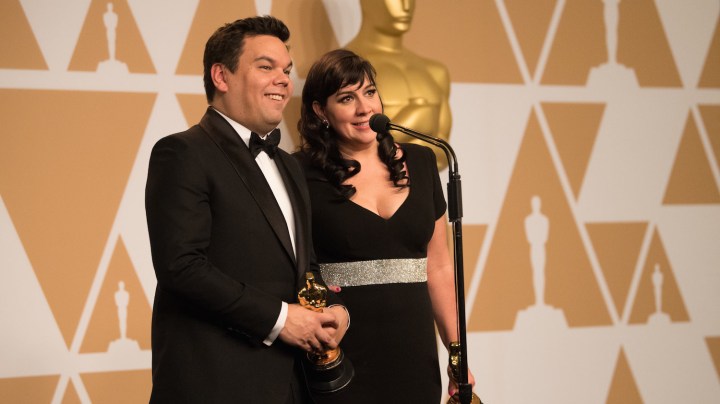“Remember Me” Songwriter After Oscar Win: “I Want to Encourage Every Brown Kid to Pursue Their Dream”

After winning the Oscar for original song for “Remember Me” from “Coco”, Robert Lopez and Kristen Anderson-Lopez pose backstage during the The 90th Oscars on Sunday, March 4, 2018. Photo by Michael Yada. Courtesy of A.M.P.A.S.
“Viva Latinoamérica!” yelled Oscar Isaac at the 90th Academy Awards before announcing Coco’s first win of the night for Best Animated Feature. Despite not being nominated himself due to the Academy’s rules, co-director Adrian Molina walked on stage alongside director Lee Unkrich, producer Darla Anderson, and Anthony Gonzalez, the voice of Miguel. Unlike in previous awards shows where Coco had been honored, Molina finally got a chance to talk and thanked the Latino community that has so enthusiastically supported the landmark production.
Back in the interview room, Remezcla asked the directors and producer about steps the industry can take so that more Latinos get to direct successful movies featuring Latino stories and Latino casts. The team gave Adrian the chance to answer. “It takes awareness of the fact that strong storytellers come from all sorts of places. At Pixar, that is something that we’re putting a lot of focus on and creating a lot of opportunity for, and I’m very thankful for the team and for the opportunities on this film. We work very hard to show that films about communities of color, films that come from particular places have a resonance that can reach across the world,” said Molina, who also served as Coco’s screenwriter.
According to the Mexican-American creator, whose mother is from Jalisco and father is half-Mexican, this is just the beginning in the current reckoning that the industry is having with matters of inclusion, and he knows change has to start at the top. “We’ve seen that with Coco, we’ve seen that with Black Panther, and I think you’re going to see it with a lot of other films in the future, and it takes going hand in hand with the studio executives and the creative talent to recognize that that is a fact and to support each other. And that is happening, and we’re starting to see it.”
Unkrich explained that six years ago, when they started making the movie, the political climate in the US was very different than the one we are in now. “While we were making the film we had a change of presidency, and a lot of things started to be said about Mexico and about Mexican-Americans that was unacceptable,” said the now two-time Oscar winner, who was first awarded for directing Toy Story 3. “And while we were making the film, we began to feel a new urgency to get the movie out into the world, to get a positive message about the beauty of Mexico, the beauty of the Mexican people, the beauty of their culture and traditions into the world, and also give Mexican and Mexican-American kids something to look up to, something to aspire to and to see a bit of themselves up on screen.”

The idea of having a role model that looks like you resonated with Filipino-American composer, and the first person in history to become a double EGOT, Robert Lopez. After winning his second Oscar for Coco’s “Remember Me” with his wife and songwriter Kristen Anderson-Lopez, Robert told the press about the importance of encouraging other people of color to succeed. “I’ve always felt ‘other’ in this country, even though I was raised very assimilated. If our success can help someone pursue their dream, I know that examples play a huge role and I want to encourage every brown kid to pursue their dream just like my mom did to me.”
“Remember Me,” which was inspired by the bolero ranchero music of the 30s and 40s in Mexico, was performed during the ceremony by Gael Garcia Bernal, Miguel, and Natalia Lafourcade, accompanied by fireworks and folklórico dancers, in what is perhaps the most beautifully Mexican moment in the awards 90-year history.